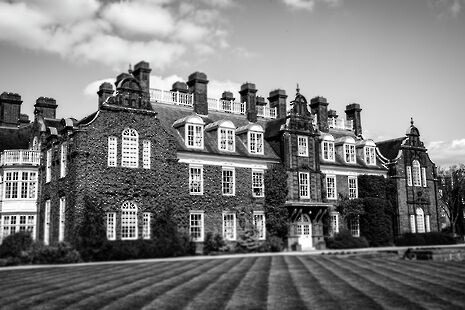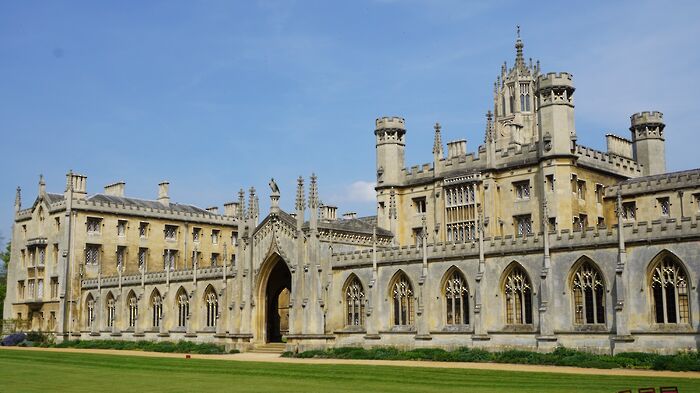‘People are struggling’: The huge disparity between college rent costs
Newnham, Girton and Robinson students are among those facing the highest costs

Hannah has to work during the holidays so that she can afford to live in Cambridge.* The vast majority of her student loan goes towards paying rent at Newnham, and her parents are “already struggling” financially, so a job is required to pay for food and other living expenses during term. If she lost this job, she says she would “struggle to pay rent and eat”.
Hannah’s story is indicative of the difficulties that many students face in paying rent in Cambridge, and of a system whereby students can expect drastically different levels of rent and standards of accommodation depending on the college they attend.
A Varsity investigation, using data obtained through freedom of information requests, has revealed huge disparities in the amount of rent undergraduates have to pay across the colleges, with a 67% difference in the average weekly rent between the most expensive college, Newnham, and the cheapest, Homerton.
While an undergraduate first-year student at Newnham can expect to pay on average £178.48 a week for rent and all compulsory chargers, the average weekly cost at Homerton is just £106.75. Newnham’s figure is 12% higher than the figure Varsity has calculated as the average across all colleges, which is £146.98 a week.
Rent, ranked
All the colleges, ranked by average weekly rent and costs, excluding Jesus and Murray Edwards (see article).

The investigation found that Robinson has the second highest average weekly cost, at £171.04, with Gonville & Caius, Queens’, and Downing making up the rest of the top five. St John’s and Pembroke were the second and third cheapest colleges respectively, with average weekly rents of £119.02 and £130.97.
However, fixed room rental times have a dramatic impact on the cost to students, with some colleges forcing undergraduates to pay for their rooms for much longer than others. All students at Girton have to pay for 37 weeks a year, making it the most unavoidably expensive college on an annual basis – with an average termly rent of £1973.33.
Other colleges are also more expensive when considered on an annual basis. While St John’s has one of the lowest average weekly costs, the length of time that it requires undergraduates to rent their rooms for, around 38.5 weeks, pushes it into the middle of the pack for average termly rent, at £1527.43.
Varsity spoke to a number of students who struggle to afford the rent at their college or have complaints about their accommodation. Rachel*, an international student from Newnham, says she “really struggle[s]” to pay rent, despite receiving both a bursary from both her college and the University.
Rachel was so dissatisfied with the cost of living at Newnham that she seriously considered moving into another college’s accommodation. She described Newnham’s policy of charging all students the same rent “unfair”, arguing that the college should have varied room rates and “let people choose based on their financial situation”.
There was also considerable variation in the amount students had to pay in supplementary compulsory charges, which significantly affected students’ overall costs. Newnham came top in this area as well, with a supplementary kitchen fixed charge of £287.95 per term, while Gonville & Caius students have to pay an ‘establishment charge’ of £203.72. Some other colleges, including Emmanuel, Downing and Girton, include such costs within their rent figures.
Differences in the way colleges charge rent make an exact like-for-like comparison difficult, both for prospective students assessing living costs before applying to Cambridge, and for this investigation. Only undergraduate rooms were looked at, and where colleges charge different rates according to year group, the 2017/18 cohort was used. All compulsory charges were taken into account, though minimum meal charges were not, as they then allow students a certain amount of food for ‘free’. Where there was a difference, the figure for the cost of compulsory charges was taken for students living in college.
The differing lengths of room licences also complicate matters. As it impossible to determine exactly how many students in Jesus and Murray Edwards are staying for what period of time, an average weekly figure could not be calculated for those colleges based on the figures provided. Other colleges also are more expensive than their weekly charges imply, as all rooms were taken as being on a short lease, whereas in reality some of them have to be rented on a long lease.
Within colleges, however, it is easier to look at increases in rent over recent years. Girton has seen the sharpest rise in rent, with an average annual increase of 7.48% over the past five years. The same period also saw notable rent increases at Magdalene, which saw an average increase of 6.47%.
In response to Varsity’s investigation, Cambridge Cut the Rent (CTR) said the findings “confirm what students have been saying: rents in Cambridge are too high”, and accused the University of failing in its stated duty to provide “the widest possible student access to the University” and in “its commitment to student welfare, which is negatively impacted by both excessive rents and unfair fines”.
“Rents are being used to plug holes in college finances, with students as cash cows on bursars’ spreadsheets,” CTR said: “This is unacceptable. As students, we have the inalienable right to affordable, good-quality accommodation. We are students, not consumers. If individual colleges are unable to address this, then the central University must step in.”
Responding to the findings, Newnham’s JCR president, Jess Lock, criticised the college’s rent and kitchen fixed charge as “extortionate”, adding that “the Newnham JCR body are evidently, and understandably, dissatisfied with the college’s fees”.
A number of colleges defended the amount of rent their students have to pay. In a statement to Varsity, Girton’s Bursar Debbie Lowther said that “the overall package provided to Girton students represents excellent value for money”, and called Girton’s charging system “simple, fair and transparent”.
She stressed that the fee paid by Girton students “includes free use of two gyms, a squash court and swimming pool on site, as well as 55 acres of gardens, grounds, sports pitches and grass tennis courts in summer.”
Lowther also defended the decision by the college to make its undergraduates pay for 37 weeks, saying that it gave students “freedom to come and go during the vacations”, “greater independence from parents or guardians”, and the possibility of finding work or internships in the vacation.
A spokesperson for Gonville & Caius also argued that their College’s rents and charges were good value, saying “we work very hard to offer high quality accommodation and food and to keep costs to students as low as possible. We also provide free wifi and laundry services, which our students greatly appreciate”.
A spokesperson for Newnham said that the College “offers a very generous system of student bursaries and rent subsidies and students in financial need are encouraged to apply for them.”
The pressures of rent are not going unchallenged by students, however. There are now five active Cut the Rent groups in various colleges, with rumblings at four more colleges. Newnham JCR committee conducted a survey of Newnhamites’ opinions on the college’s rent and kitchen fixed charge, which received 237 unique responses, with Lock saying she is “content” that “visible action will be taken in the following weeks to address issues” with the kitchen fixed charge after meeting with the senior tutor and bursar.
*Some students’ names have been changed
- This article was amended to update the figures for Fitzwilliam and King’s, and the overall average figure was adjusted accordingly
 News / Cambridge academics sign open letter criticising research funding changes22 February 2026
News / Cambridge academics sign open letter criticising research funding changes22 February 2026 News / Supporters protest potential vet school closure22 February 2026
News / Supporters protest potential vet school closure22 February 2026 News / Student and union protesters hold ‘Trans Liberation Solidarity Rally’ 24 February 2026
News / Student and union protesters hold ‘Trans Liberation Solidarity Rally’ 24 February 2026 News / Union speakers condemn ‘hateful’ Katie Hopkins speech14 February 2026
News / Union speakers condemn ‘hateful’ Katie Hopkins speech14 February 2026 News / Union cancels event with Sri Lankan politician after Tamil societies express ‘profound outrage’20 February 2026
News / Union cancels event with Sri Lankan politician after Tamil societies express ‘profound outrage’20 February 2026











